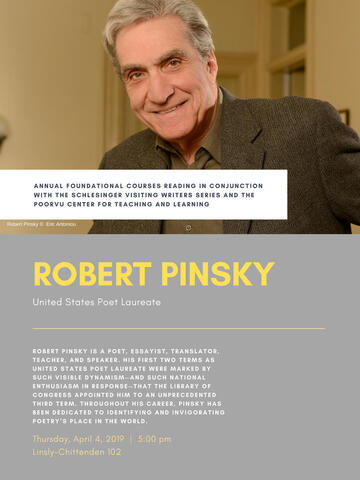
Robert Pinsky’s first two terms as United States Poet Laureate were marked by such visible dynamism, and such national enthusiasm in response, that the Library of Congress appointed him to an unprecedented third term. Throughout his career, Pinsky has been dedicated to identifying and invigorating poetry’s place in the world.
As Poet Laureate, Robert Pinsky founded the Favorite Poem Project, in which thousands of Americans — of varying backgrounds, all ages, and from every state — shared their favorite poems. The project’s videos, giving voice to the American audience for poetry, demonstrates that, contrary to stereotype, poetry had a vigorous presence in the American cultural landscape. The anthology “Americans’ Favorite Poems,” which includes letters from project participants, is in its 18th printing. A more recent anthology, “An Invitation to Poetry,” comes with a DVD featuring the FPP video segments, including new videos sponsored by the Poetry Foundation. In 2013 WW Norton published “Singing School: Learning to Read (and Write) Poetry by Studying with the Masters,” a unique combination anthology, personal essay and textbook.
Elegant and tough, vividly imaginative, Pinsky’s poems have earned praise for their wild musical energy and range. “Selected Poems” (FSG, 2011) is a collection that spans his career. His “The Figured Wheel: New and Collected Poems 1966-1996” was a Pulitzer Prize finalist. Pinsky often performs his poems with eminent jazz musicians, in venues ranging from schools and universities to jazz clubs. His CDs “PoemJazz” and “PoemJazz II House Hour,” with Grammy-winning pianist Laurence Hobgood, were released by Circumstantial Productions.
Robert Pinsky’s landmark, best-selling translation of “The Inferno of Dante” received the Los Angeles Times Book Award and the Howard Mor ton Landon Prize for translation. He is also co-translator of “The Separate Notebooks,” poems by Nobel Prize winner Czeslaw Milosz. Pinsky’s prose book, “The Life of David”, is a lively retelling and examination of the David stories, narrating a wealth of legend as well as scripture. Pinsky also wrote the libretto for Tod Machover’s opera “Death and the Powers: A Robot Pageant,” which premiered in Monaco in fall 2010. His book, “Selected Poems,” was published by Farrar Strauss & Giroux in spring of 2011. He was editor of “The Best of the Best American Poetry,” the twenty-fifth volume of the popular Best American Poetry series. In March-June 2013, the Shakespeare Theatre Company performed his newly commissioned adaptation and translation of Friedrich Schiller’s “Wallenstein.” His newest book is a collection of poems titled “At the Foundling Hospital” (FSG, October 2016).
Pinsky’s Tanner Lectures at Princeton University were published as “Democracy, Culture and the Voice of Poetry” (Princeton University Press, 2002). His Campbell Lectures at Rice University were published as “Thousands of Broadways: Dreams and Nightmares of the American Small Town” (University of Chicago Press, 2009). His online MOOC, “The Art of Poetry,” began on the EdX platform in September 2014.
Robert Pinsky is the only member of the American Academy of Arts and Letters to have appeared on “The Simpsons” and “The Colbert Report.” For years a regular contributor to PBS’s The News-Hour, he publishes frequently in magazines such as The New Yorker, The Atlantic Monthly, The Threepenny Review and The Best American Poetry anthologies. He teaches in the graduate writing program at Boston University. Pinsky is also the winner of the PEN/Voelcker Award, the William Carlos Williams Prize, the Lenore Marshall Prize, Italy’s Premio Capri, the Korean Manhae Award and the Harold Washington Award from the City of Chicago.
The Foundational Courses Lecture connects the introductory courses in the English major to 21st-century writing by inviting a contemporary writer of major stature to read from her work, reflecting in particular on influences and inheritances from the past. It is to be an annual department-wide event bringing together our majors, our graduate students, and our faculty in English.